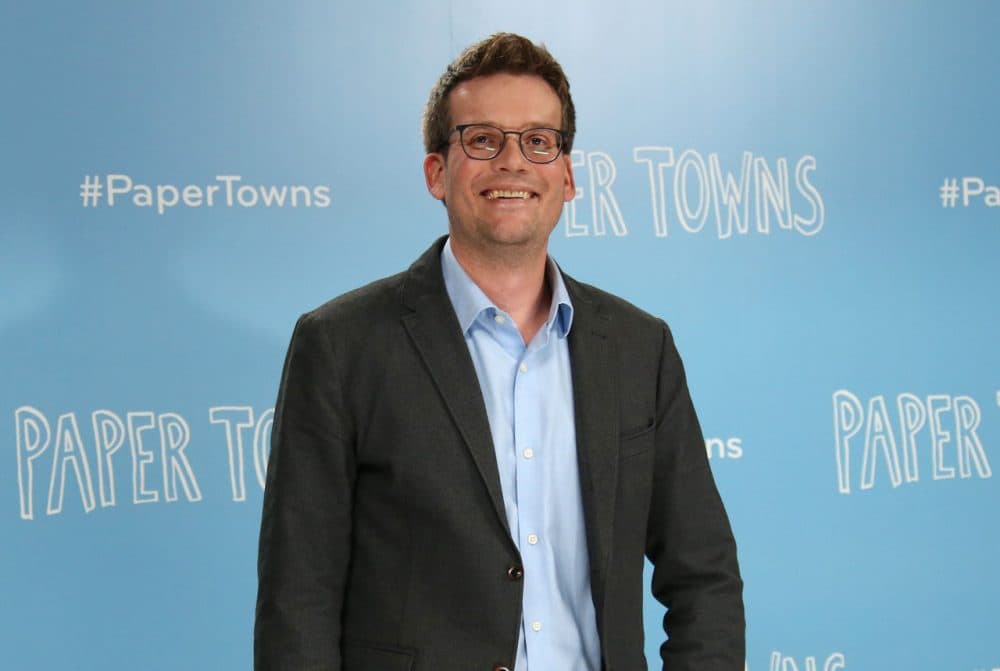Advertisement
'Paper Towns' Author John Green Taps Into Teens
Resume
"Paper Towns," the film based on the young adult novel by John Green, opens in theaters tomorrow. The New Yorker has called Green "the teen whisperer" because of the huge following he's amassed through his video blogs and bestselling books like "The Fault in Our Stars."
But as Green told Here & Now's Meghna Chakrabarti, he's not sure why his work appeals to teens, but he hopes they respond to it.
"I try to take teenagers seriously and credit them with the intelligence and curiosity that I've seen in them, and that I remember from my own adolescence," he said.
Interview Highlights: John Green
What "Paper Towns" is about
"For me the book started with my thinking of my own high school experience and the way that I looked at girls that I liked, and a lot of times I idealized them and put them on a pedestal and romanticized them, and sort of thought that was what you're supposed to do, I thought that was how the male gaze was supposed to work. But of course it's really dehumanizing to see someone as more than a person, and it proves in the end, I think, really destructive to everyone involved."
"The great challenge of adulthood is imagining other people complexly and understanding that their grief and joy and suffering is as real as our own. And so that's what I really wanted this story to be about, Q's journey toward trying to understand Margot more complexly, rather than just seeing her as the person that he projects his own ideas onto."
On how he relates to the story
"I think all those times in life that are beginning times and ending times, times of firsts and lasts, are really interesting to write about and really fun to write about. For me, the end of high school was a really important time in my life and the closest friends that I had, those were the people who helped me to understand the world around me, and I wasn't going to be with them everyday anymore. And that was really hard for me to imagine and hard for me to reconcile myself to. So I guess I kind of wanted to go back there and relive some of my favorite parts of those friendships, but also acknowledge the fact that they do change, I mean it does change when you graduate from high school, and things are going to be different and there are going to be some lasts involved in that leaving."
"A lot of people sort of dismiss, particularly they think of this generation of young people as being disinterested in the world and being distracted by technology and living these lives of sort of mere distraction, and that's not been my experience at all."
Characterizing today's teenagers
"I mean, I think that optimism is honest and I think that nihilism is inherently dishonest. I think that the truth is always hopeful, so maybe that's something that I have in common with them. A lot of people sort of dismiss, particularly they think of this generation of young people as being disinterested in the world and being distracted by technology and living these lives of sort of mere distraction, and that's not been my experience at all. I see a generation of people who are tremendously engaged and active, who are pushing important issues around social justice, who are deeply engaged in the questions about what the meaning of life is, whether it's constructed or derived, what our responsibilities are to each other, and I just find that stuff really rewarding to think about and talk about with them, because they don't approach those questions through irony, they don't approach those questions with embarrassment. They're just excited to think about that stuff, and that's how I still feel, I guess. I still feel unironically excited to think about the opportunity to think about the meaning of life, about the opportunity to think about how to solve big problems and how to reduce suffering. They're really inspirational to me in those respects."
On the importance of Esther Earl and "The Fault in Our Stars"
"Esther Earl was a really important member of the Nerdfighter community, she was part of a small group of people who were deeply involved in a lot of our charity projects, and she had cancer throughout the time that I knew her and died in August of 2010 when she was 16. And I did write a lot of 'The Fault in Our Stars' in the wake of Esther's death and that sort of furious year of grief that came afterwards. I'd been trying to write a book like it for a long time, but Esther taught me a lot, she taught me that a short life can also be a good and rich and full life. She also taught me how empathetic teenagers can be. I don't think that I'd given enough credit to how empathy works in adolescence until I became close to Esther."
Guest
- John Green, bestselling author of young adult (YA) fiction and a video blogger. He tweets @johngreen.
This segment aired on July 23, 2015.
